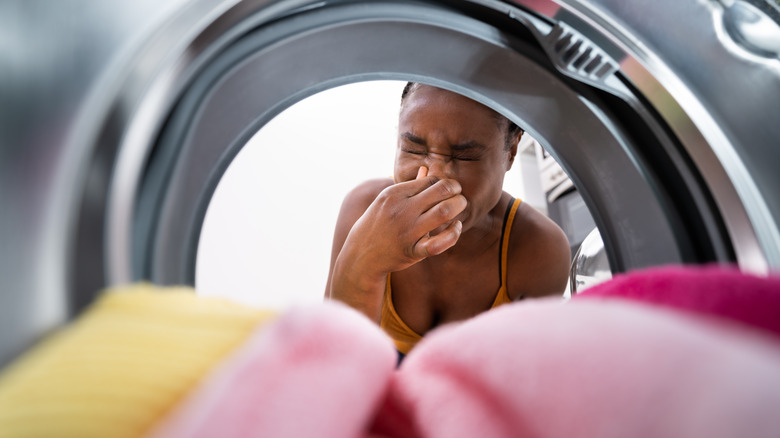What Really Happens If You Store Your Dirty Laundry In The Washing Machine?
We may receive a commission on purchases made from links.
At the end of a long day, it might seem like an ingenious idea to simply throw your dirty clothes in your washing machine. If you do this every day, the appliance will already be filled by the time laundry day comes around. While this may seem like a harmless practice, it can actually have some negative effects. Leaving your dirty clothes in the washer can be a recipe for trouble, as it could lead to the spread of both bacteria and mold.
The moist conditions inside a washing machine provide an ideal breeding ground for bacteria, especially when it contains wet towels, washcloths, and clothes that are moist from sweat. According to a 2020 study published by GMS Hygiene and Infection Control, bacteria survive better in humid environments. Further, a 2021 study published by Applied and Environmental Microbiology discovered that the bacteria that's present in dirty laundry can often stem from fecal matter and include E. coli and salmonella. Therefore, keeping your contaminated garments in the humid washer could allow the germs to thrive on both your textiles and the inside of the appliance, which could easily make you and those in your household sick. This can also produce unpleasant smells that can linger in your laundry, even after your clothes have gone through a wash cycle.
Mold growth in washers
The damp, dark interior of a washer also provides a perfect haven for mold growth. Even when washers are left empty, especially front-loading machines, there is a potential for mold build-up. In fact, a 2015 study published by Fungal Biology found that 79% of the 70 empty washing machines they tested contained some type of fungi. Since the rubber gasket seal is created to prevent water from spilling, it is impermeable. However, that feature also traps humidity in a dark and airtight space, which causes mold growth. That's why it's recommended to leave the appliance door open when not in use to allow air to flow through.
However, if you leave your dirty clothes in the washer for multiple days, this prevents air from flowing inside the machine, increasing the humidity and therefore the potential for the spread of fungi. Also, dirty clothes can encourage mold growth from food, dirt, sweat, and moisture that may be present on your garments. This can create a musty smell on both your clothes and the inside of your appliance that's hard to remove. More importantly, mold can also trigger a range of health problems like allergic reaction symptoms and skin irritation, per the Centers for Disease Control and Prevention. For those with asthma or other health conditions, it can make their symptoms worse as well.
A better option
To achieve the convenience of having clothes close to your washing machine on laundry day without encouraging bacteria spread or mold growth, there's an easy solution. These consequences can easily be avoided by storing dirty clothes in a well-ventilated hamper placed next to your washer. Hampers made from a material that allows for breathability are best, making wicker a good choice. It is a stylish laundry basket material option that also provides adequate airflow through multiple open-air pockets. For instance, you could purchase the Seville Classics Lidded Rectangular Wicker Hamper with Washable Liner from Home Depot for about $45.
You can also choose a hamper that's made out of canvas or mesh. Not only are these materials flexible and therefore easy to slide into small spaces, but canvas hampers can also be washed in the washing machine, so you can remove any bacteria or smells from dirty laundry. Canvas and mesh hampers can both begin at less than $20. For example, the Dokehom Collapsible Drawstring Laundry Basket is made from canvas and goes for about $12 on Amazon.
Additionally, after you do a laundry load, make sure to unload your washing machine promptly after the cycle is complete and keep the door slightly open. Never leave your clean, wet clothes in the washer overnight or even for any longer than necessary. Instead, hang your clothes to dry or transfer them to the dryer immediately to prevent the growth of bacteria and mold.



